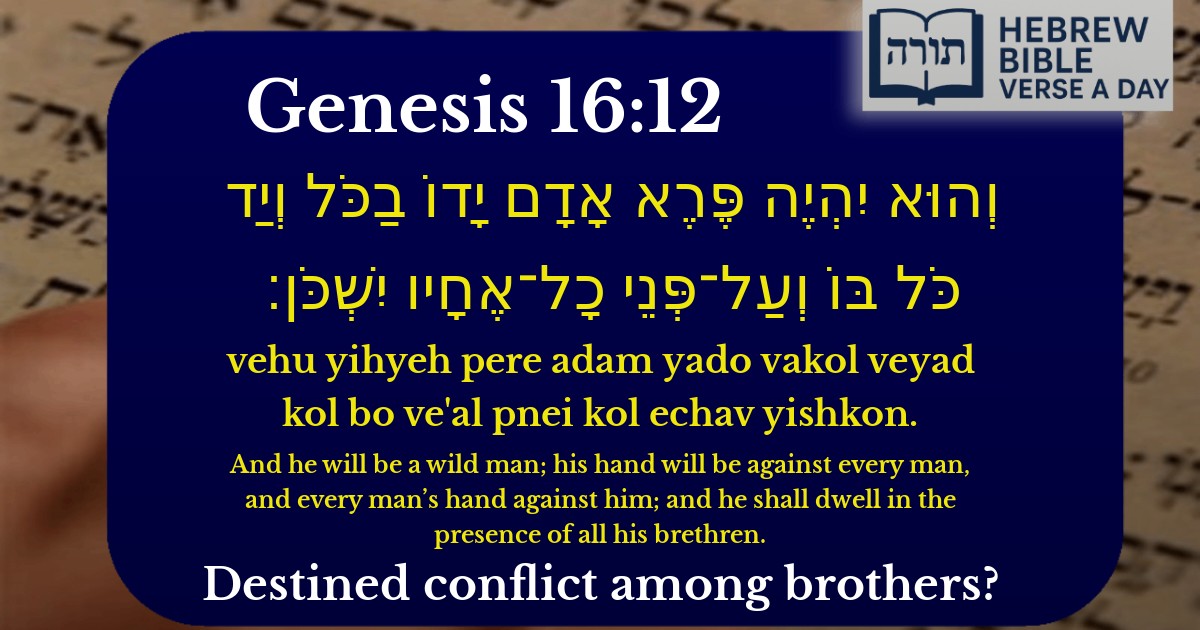Join Our Newsletter To Be Informed When New Videos Are Posted
Join the thousands of fellow Studends who rely on our videos to learn how to read the bible in Hebrew for free!
Hebrew Text
וְהוּא יִהְיֶה פֶּרֶא אָדָם יָדוֹ בַכֹּל וְיַד כֹּל בּוֹ וְעַל־פְּנֵי כָל־אֶחָיו יִשְׁכֹּן׃
English Translation
And he will be a wild man; his hand will be against every man, and every man’s hand against him; and he shall dwell in the presence of all his brethren.
Transliteration
Vehu yihyeh pere adam yado vakol veyad kol bo ve'al pnei kol echav yishkon.
Hebrew Leining Text
וְה֤וּא יִהְיֶה֙ פֶּ֣רֶא אָדָ֔ם יָד֣וֹ בַכֹּ֔ל וְיַ֥ד כֹּ֖ל בּ֑וֹ וְעַל־פְּנֵ֥י כׇל־אֶחָ֖יו יִשְׁכֹּֽן׃
וְה֤וּא יִהְיֶה֙ פֶּ֣רֶא אָדָ֔ם יָד֣וֹ בַכֹּ֔ל וְיַ֥ד כֹּ֖ל בּ֑וֹ וְעַל־פְּנֵ֥י כׇל־אֶחָ֖יו יִשְׁכֹּֽן׃
🎵 Listen to leining
Parasha Commentary
📚 Talmud Citations
This verse is quoted in the Talmud.
📖 Niddah 31a
The verse is referenced in a discussion about the nature of Esau and his descendants, illustrating their contentious relationship with others.
📖 Avodah Zarah 2b
The verse is mentioned in the context of discussing the characteristics and fate of the nations, particularly in relation to Esau's descendants.


Explanation of the Verse (Genesis 16:12)
The verse describes the destiny of Yishmael (Ishmael), the son of Avraham and Hagar. The angel’s prophecy to Hagar outlines Yishmael’s character and future role in the world. Orthodox Jewish commentators provide deep insights into the meaning of these words.
1. "וְהוּא יִהְיֶה פֶּרֶא אָדָם" – "And he will be a wild man"
2. "יָדוֹ בַכֹּל וְיַד כֹּל בּוֹ" – "His hand will be against every man, and every man’s hand against him"
3. "וְעַל־פְּנֵי כָל־אֶחָיו יִשְׁכֹּן" – "And he shall dwell in the presence of all his brethren"
Broader Implications in Jewish Thought
This prophecy is seen as a foundational text regarding the relationship between the descendants of Yishmael and the Jewish people. Traditional sources often reference this verse when discussing historical and eschatological conflicts involving the Ishmaelites (later identified with Arab and Muslim nations). The tension described in this verse is understood as part of the divine plan, with eventual resolution in the Messianic era, as alluded to in later prophetic texts.